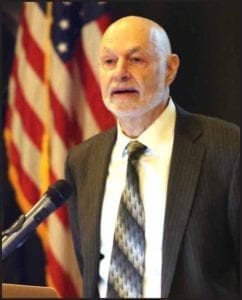Herzig: Act Today, Look To Tomorrow

In response to an outpouring of criticism at a public hearing on the GEIS Tuesday, March 5, to Oneonta City Hall and Otsego Now’s plans to redevelop the D&H railyards, Mayor Gary Herzig had an elegant reply.
Development on the 50 acres suitable for job-generating enterprises will:
• One, be as energy efficient as construction technology currently allows.
• Two, use as little natural gas and fossil fuels as possible.
• Three, use as much renewable technology as is available right now.
But no, Herzig’s City Hall is not going to derail Oneonta’s single greatest job-development (and tax-generating) prospect.
And, in an interview over the weekend, he was pointed: “We should not let those who are economically secure, by comparison, tell those who need jobs they can’t have them.”
Yes, of course, combatting Global Warming is a Good, but it’s not the only Good. The city’s just-updated Comprehensive Master Plan, he said, also embraced the values of “social justice” and “shared sacrifice.”
And those principles: Energy efficiency, social justice and shared sacrifice, will guide the railyards’ redevelopment.
•
Meanwhile, muscular environmentalism is getting tiresome – and unhelpful. Too often since the anti-fracking movement – it turned out there’s too little gas around here to frack it – we’ve seen intimidation as the local environmental movement’s preferred tactic, and it’s getting old.
We lack sufficient natural gas to even fuel our major institutions – our colleges and hospitals – not to
mention any growth.
Yet roomfuls of The Outspoken helped block the Constitution Pipeline that would have filled the need – snap! – and generated $13 million in annual tax revenues if routed through southern Otsego County.
XNG trucks are OK on
I-88, but on our narrow roads were a danger, and they’ve now mostly been routed to more appropriate Route 8 in Chenango County, but – lacking a pipeline – compressed natural gas, delivered by truck, is the one sensible alternative.
Yet The Outspoken – notably Dec. 12, when the Oneonta Town Board was browbeaten into passing a resolution against the $17.5 million decompression
station – helped halt that sensible alternative to a pipeline endorsed by both the Mohawk Valley and Southern Tier regional economic development councils.
Without gas, the REDCs recognized, Otsego and the surrounding counties are done – finished! – as viable economies.
Yet Otsego 2000, the Cooperstown-based environmental group – has issued not-so-veiled threats to sue both City Hall and Otsego Now, if necessary, to halt the decompression station, which would largely be paid for with state money and would fill the county’s natural gas needs until blessed renewables come on line.
For now, not forever! Yes, yes, we all agree:
Renewables are the future. But not the present, perhaps not even for a generation. (New York State’s plan targets 2040 for partially achieving fossil-fuel freedom.)
•
Even then, renewables may not be the whole answer. This past Tuesday, Len Carson, DC Marketing president and a Ward 5 Common Council candidate, circulated a TED Talk video prior to Wednesday’s
Citizen Voices meeting.
It was delivered by Michael Shellenberger, one of Time magazine’s 2008 Heroes of the Environment.
Its title, “How Fear of Nuclear Power is Hurting the Environment.”
In it, he argues that, despite the vast advances in solar farms planned in the U.S., Europe, even India, the data show that, without an expansion of nuclear, the Earth is doomed.
OK, Outspeakers, let it out.
All of this needs to be
considered in context. While we argue over something that’s big here, the D&H plans are tiny, tiny in the context of the world’s economy and population – there are too few of us to either save the world or ruin it.
So let’s relax.
Another Common Council candidate, Seth Clark in Ward 2, nailed it at the GEIS hearing: “We need hundreds and hundreds of jobs. We not only owe our children the future, we owe them a couple of hot meals a day.”
In an intriguing Letter to the Editor this week, Otego’s Dennis Higgins applies Kant’s “Categorical Imperative” to the debate. Do unto others. But this isn’t good vs. evil; it’s a practical one.
Herzig’s three-point
approach is a strategic, sensible, short-term way to tackle a conundrum: Putting food on children’s plates today, while we await a better solution – one we all agree with – tomorrow.

